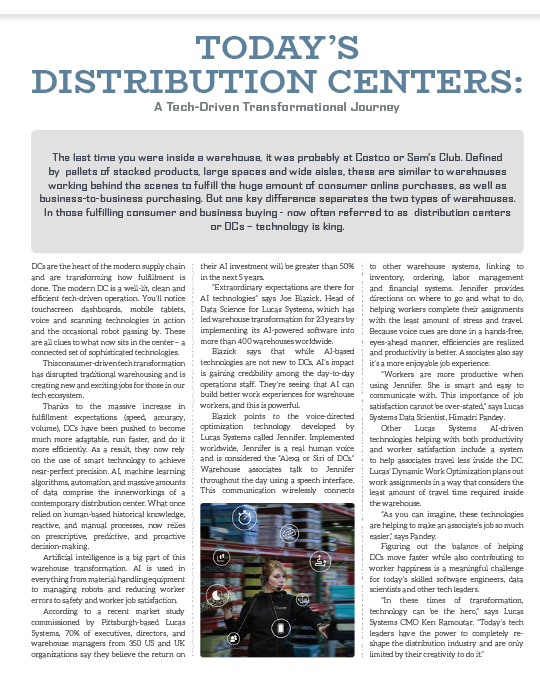Today’s Distribution Centers: A Tech-Driven Transformational Journey
By Lucas Systems
 The last time you were inside a warehouse, it was probably at Costco or Sam’s Club. Defined by pallets of stacked products, large spaces and wide aisles, these are similar to warehouses working behind the scenes to fulfill the huge amount of consumer online purchases, as well as business-to-business purchasing. But one key difference separates the two types of warehouses. In those fulfilling consumer and business buying - now often referred to as distribution centers or DCs – technology is king.
The last time you were inside a warehouse, it was probably at Costco or Sam’s Club. Defined by pallets of stacked products, large spaces and wide aisles, these are similar to warehouses working behind the scenes to fulfill the huge amount of consumer online purchases, as well as business-to-business purchasing. But one key difference separates the two types of warehouses. In those fulfilling consumer and business buying - now often referred to as distribution centers or DCs – technology is king.
DCs are the heart of the modern supply chain and are transforming how fulfillment is done. The modern DC is a well-lit, clean and efficient tech-driven operation. You’ll notice touchscreen dashboards, mobile tablets, voice and scanning technologies in action and the occasional robot passing by. These are all clues to what now sits in the center – a connected set of sophisticated technologies.
This consumer-driven tech transformation has disrupted traditional warehousing and is creating new and exciting jobs for those in our tech ecosystem.
Thanks to the massive increase in fulfillment expectations (speed, accuracy, volume), DCs have been pushed to become much more adaptable, run faster, and do it more efficiently. As a result, they now rely on the use of smart technology to achieve near-perfect precision. AI, machine learning algorithms, automation, and massive amounts of data comprise the innerworkings of a contemporary distribution center. What once relied on human-based historical knowledge, reactive, and manual processes, now relies on prescriptive, predictive, and proactive decision-making.
Artificial intelligence is a big part of this warehouse transformation. AI is used in everything from material handling equipment to managing robots and reducing worker errors to safety and worker job satisfaction.
According to a recent market study commissioned by Pittsburgh-based Lucas Systems, 70% of executives, directors, and warehouse managers from 350 US and UK organizations say they believe the return on their AI investment will be greater than 50% in the next 5 years.
“Extraordinary expectations are there for AI technologies” says Joe Blazick, Head of Data Science for Lucas Systems, which has led warehouse transformation for 23 years by implementing its AI-powered software into more than 400 warehouses worldwide.
Blazick says that while AI-based technologies are not new to DCs, AI’s impact is gaining credibility among the day-to-day operations staff. They’re seeing that AI can build better work experiences for warehouse workers, and this is powerful.
Blazick points to the voice-directed optimization technology developed by Lucas Systems called Jennifer. Implemented worldwide, Jennifer is a real human voice and is considered the “Alexa or Siri of DCs.” Warehouse associates talk to Jennifer throughout the day using a speech interface. This communication wirelessly connects to other warehouse systems, linking to inventory, ordering, labor management and financial systems. Jennifer provides directions on where to go and what to do, helping workers complete their assignments with the least amount of stress and travel. Because voice cues are done in a hands-free, eyes-ahead manner, efficiencies are realized and productivity is better. Associates also say it’s a more enjoyable job experience.
“Workers are more productive when using Jennifer. She is smart and easy to communicate with. This importance of job satisfaction cannot be over-stated,” says Lucas Systems Data Scientist, Himadri Pandey.
Other Lucas Systems AI-driven technologies helping with both productivity and worker satisfaction include a system to help associates travel less inside the DC. Lucas’ Dynamic Work Optimization plans out work assignments in a way that considers the least amount of travel time required inside the warehouse.
“As you can imagine, these technologies are helping to make an associate’s job so much easier,” says Pandey.
Figuring out the balance of helping DCs move faster while also contributing to worker happiness is a meaningful challenge for today’s skilled software engineers, data scientists and other tech leaders.
“In these times of transformation, technology can be the hero,” says Lucas Systems CMO Ken Ramoutar. “Today’s tech leaders have the power to completely re-shape the distribution industry and are only limited by their creativity to do it.”